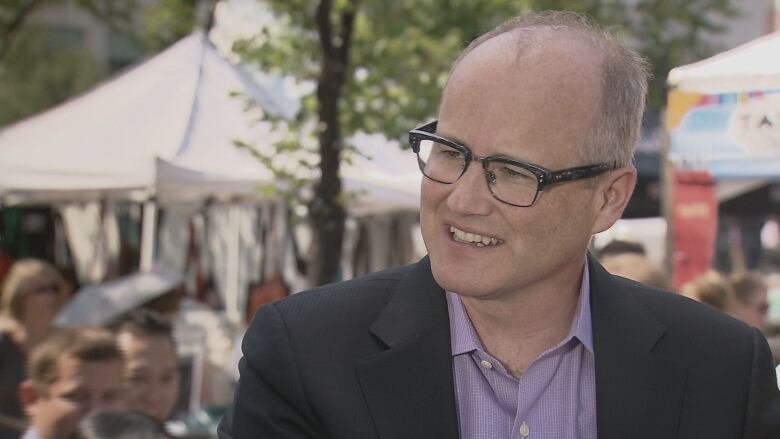Keith Boag: Is politics broken? We might share the blame
We're frequently disappointed with our politicians, but some of that might be our fault
In 2011, just 61 per cent of registered voters turned up at the polls on election day.
We're supposed to be shocked by the dwindling numbers who participate in our elections but frankly, I'm surprised the numbers aren't lower.
- Vote Compass: Find out where you fit on political spectrum
- Canada Votes: CBC's full election coverage
- Poll Tracker: How the parties are faring in latest polls
Most of us don't seem to like politics very much.
According to a survey by Samara Canada in 2012, politics is almost never the concern of dinner table chatter in most Canadian homes.
Only 40 per cent of us say we've had even a single conversation about a political issue in the last 12 months.
Still, when we talk about disengagement and consider the question "Is politics broken?" the ensuing discussion tends usually toward our disappointments.
We're disappointed with elected people; we're disappointed with the voting system; we're disappointed with how Parliament works.
Would it kill us to ask, just for a change, whether some of the fault might also be in ourselves?
Arguments for and against democracy
Someone reminded me recently of what Winston Churchill said about democracy. I don't mean the famous observation that "democracy is the worst form of government except for all those other forms that have been tried from time to time."
I mean the other one the contrary, and slightly less-known one:"The best argument against democracy is a five-minute conversation with the average voter."
It was Stephen Carter who reminded me of that when I met him in Calgary this summer. He also acknowledged he'd get into trouble for saying it.
The youngish (to me) Carter has become a minor celebrity among the chattering classes because of his role in some closelywatched Alberta campaigns: the Naheed Nenshi election as mayor of Calgary;the Alison Redford takeover of the Alberta Progressive Conservative Party; and the Redford victory in the subsequent provincial election.

They all have things in common.
Each victory confounded the pundits. All the campaigns looked as though they'd uncovered fresh seams of progressive voters in Alberta. And in every case, lurking in the political backrooms, was a smiling Stephen Carter, who seemed to know something the rest of us didn't.
Not having met Carter before, I gamely asked whether he was the discoverer of some new and magical way to penetrate the mind of the average voter and plant the seed of whatever the "new big idea"of a campaign was.
The question betrayed my ignorance of how profoundly cynical he is about the average voter. I soon learned.
"I'm tremendously cynical!" he boasted quite happily.
And then, by way of illustration, he explained to me the key to his first big triumph, the Nenshi victory.
"Let's be clear about who Nenshi is, right? Nenshi is a policy genius. Nenshi is a man of the people, Nenshi is a celebrity! So clearly it had to be those things, right?"
That sounded reasonable, to me.
"No. No it wasn't. It wasn't. Sorry!" said Carter, apparently tickled.
'They took other people's word for it'
Of the 130,000 unique visits to the Nenshi website during the election campaign, Carter told me, fewer than 3,000 stayed on the policy page for longer than five seconds.
"Five seconds!" he laughed.
"And we still got 144,000 votes! So there were even people, who never understood what his issues were, who voted for him, who thought he was the smartest candidate."
What the campaign did was push hard on the image of Nenshi as the smart, hip media darling. That image spread among voters and then swept them up, said Carter.
"That became the mob.The mob said he's the smartest candidate, with absolutely no evidence that they themselves had. They took other people's word for it. They took the general direction from the rest of the mob."
Carter's success was only in finding new ways to do the old things that political operatives have always done: move voters with simplistic ideas and encourage soaring expectations.
That doesn't mean that voters who are moved by simplistic ideas and soaring expectations can't choose a satisfactory government. But it might be more of a happy coincidence than an informed choice.
Carter is not the first political operative to suggest that to get a more honest politics we need to get a better electorate.
But that doesn't mean smarter voters it means more engaged voters. And there are ways to make that happen; indeed, there are ways in which it is happening already.
That's what we explorein our feature look at politics on The National. You'll hear more from Carter, but also counter-arguments from less cynical voices,suggestions about how things could be better andan example of how citizens can still set the policy goalposts for government.
But in the context of our current federal campaign, it might also prompt you to question whether the sometimes eye-rolling claims we hear from the candidates on the stump aren't really just the tales we've often told them we wanted to hear.
Watch Keith Boag's feature, tonight on The National at 9 p.m. ET on CBC News Network and 10 p.m./10:30 NT on CBC Television.













_(720p).jpg)


 OFFICIAL HD MUSIC VIDEO.jpg)
.jpg)



























































































